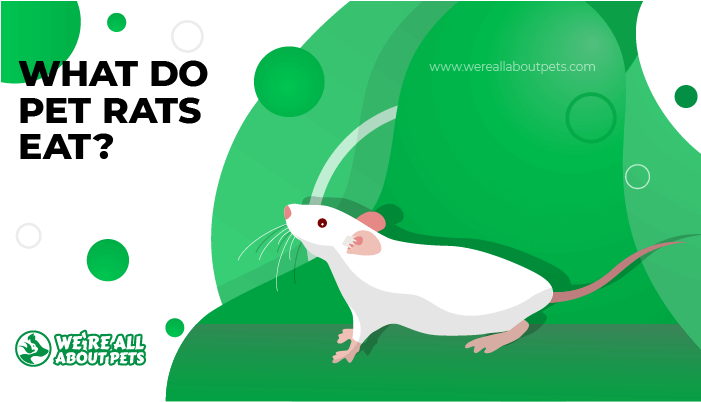10 Reasons Why Pet Rats Make Great Pets
This page contains affiliate links. We may earn money or products from the companies mentioned in this post through our independently chosen links, which earn us a commission. Learn More
Bringing a new pet into your life isn’t something to take lightly. Pets are wonderful, but they can be a big responsibility as well. From choosing the right cage and providing a healthy diet to making sure your pet’s needs for veterinary care are met, it can be a bigger undertaking than you may imagine.
Before you bring home a new pet, it’s important to do your research. Learn everything you can about the pet you’re considering to make sure you’re prepared to provide proper care.
When it comes to pet rats, there are many things to like but some important factors to consider as well. Read on to learn the top 10 reasons why rats make great pets.
#1. Rats Make Great Beginner Pets
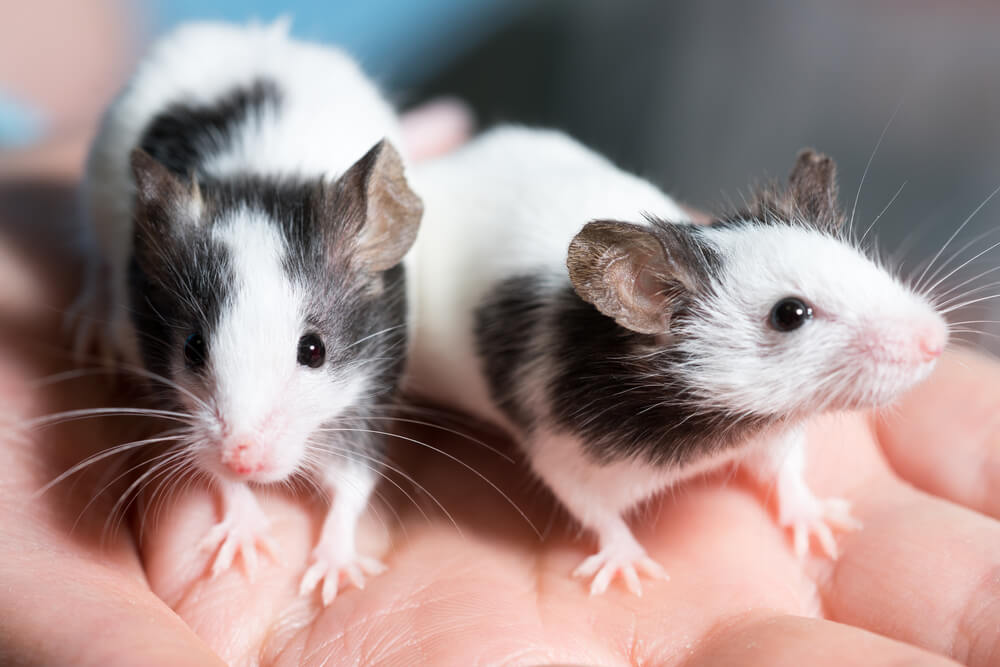
Though only about 3% of American households have rats as pets, they are a wonderful option to consider – especially if you’re new to pet ownership. Rats grow an average of 9 to 11 inches long, plus up to 8 inches for their tail. These little pets live up to 3 years with proper care.
Their small size is certainly a good thing, but rats are also fairly simple to care for and they don’t require any special equipment. All you need is a suitable cage with opportunities for exercise, toys for enrichment, and a proper diet to get started with a pet rat.
Just keep in mind that while rats make great starter pets, they are by no means a “throwaway” pet. They aren’t a pet you can simply keep in the cage and not pay any attention to – they are very social animals, and they deserve regular veterinary check-ups just like any other pet.
#2. Pet Rats Stay Small And Don’t Take Up A Lot Of Space
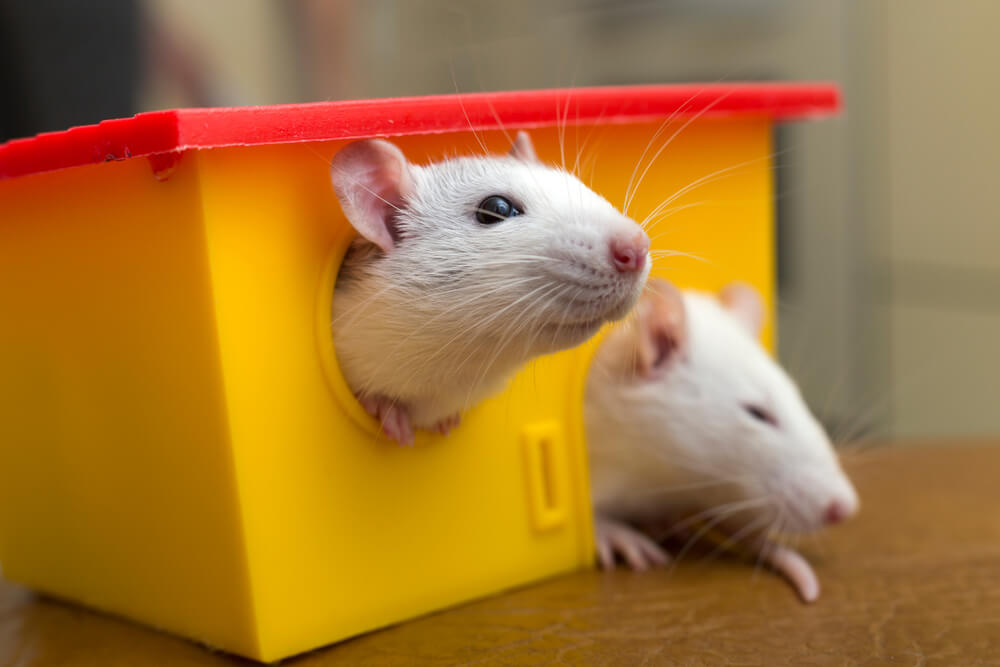
Pet rats come in different sizes, but they generally stay around 10 inches plus the length of their tail. When it comes to their habitat, rats need at least 12×24 inches of space – a minimum of 2 square feet. This is an absolute minimum, however. It’s always better to provide your pets with extra space if you can. Keep in mind as well that you’ll need a larger cage if you keep more than one rat.
When it comes to choosing the best rat cage, look for a cage with a solid bottom and a wire top. The solid bottom is important for containing bedding while the wire or mesh top is good for ventilation. Just make sure the spacing of the bars isn’t small enough that your rat’s feet can get stuck or wide enough that your pet rat can escape.
At a minimum, your rat cage should provide places to sleep and hide, an exercise wheel, toys, and food and water. If you choose to litter train your rat, you’ll also need room for a litter box.
#3. Rats Are Smart And Trainable
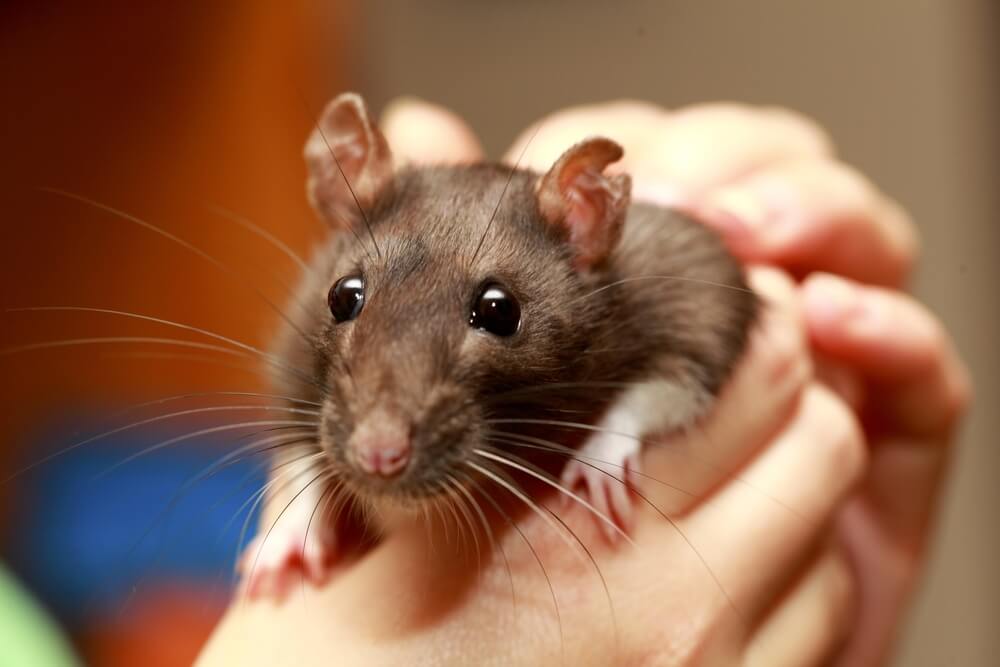
Speaking of training your rat, rats are incredibly smart. Studies have shown that rats are incredibly self-aware, and they have the ability to make decisions based on what they do or don’t know, much like humans. They can even learn their own name and come when called!
When you think of scientific studies, you probably think of rats as common test subjects. Rats are particularly popular for psychological studies because they are highly intelligent, and their behavior can give us clues to better understand human behavior. All it takes is some time, dedication, and the right motivation (generally food rewards) to train your rat. Pet rats can be trained to perform simple tricks, to run through mazes, and can even solve puzzles.
#4. There Are Many Different Kinds Of Pet Rat
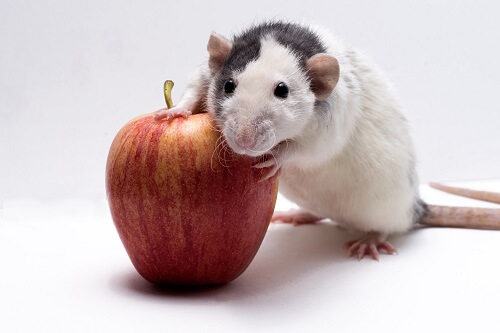
When you walk into the small animal section of the pet store, the rats you are most likely to see are fancy rats. The fancy rat is a domesticated version of the brown rat (Rattus norvegicus) and they have risen in popularity since the 1970s when the English National Fancy Rat Society (NFRS) was founded.
While most pet rats come from the same species, they come in many different coat types, colors, and patterns. Here’s a list of 7 types of fancy rat (Rattus norvegicus domestica):
- Standard
- Rex
- Tailless
- Hairless
- Satin
- Dumbo
- Bristle coat
If you’re looking for a unique pet, your options may be limited at your local pet store but you can find different varieties of fancy rat by talking directly to breeders.
#5. Pet Rats Are Surprisingly Clean
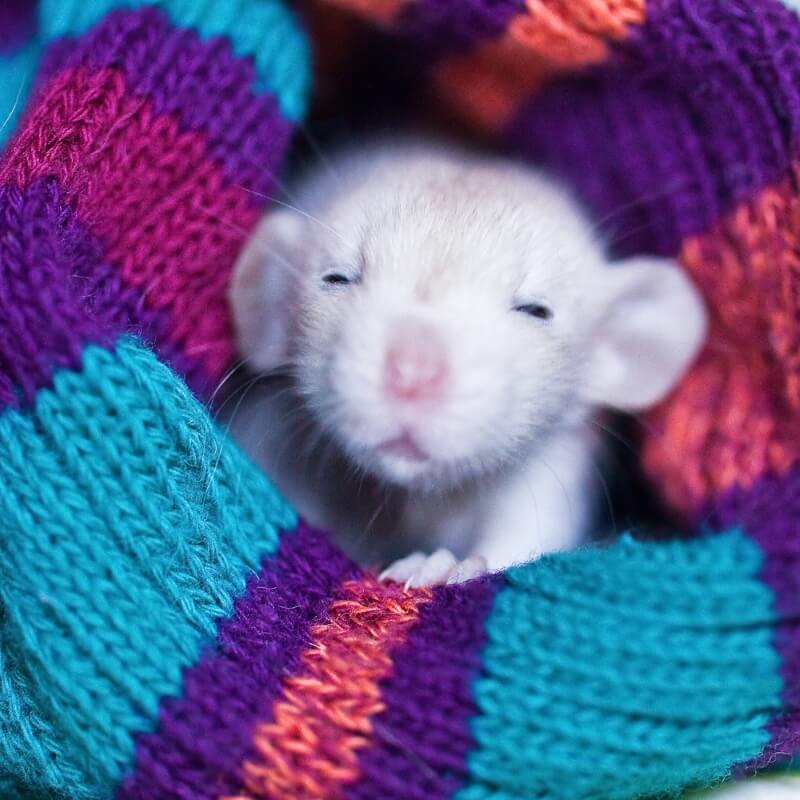
Many people associate rats with squalor, but they are actually incredibly clean animals. In fact, rats are fastidious groomers – they like to keep themselves clean and their cages organized. Many rats keep their food in tidy little piles and they also tend to do their business in one area of the cage rather than making a mess all over the place.
The fact that rats are naturally clean (and smart) means you can train them to use a little box. It’s not even very difficult to do!
To litter train your rat, start by placing a temporary litter box in each corner of the cage. Rats will naturally do their business in a corner, so this shouldn’t be a problem. Fill the litter boxes with something different than what’s in the cage. Over time, you’ll notice your rat favoring one litter box over the others, at which point you can remove the other three.
#6. Pet Rats Are Fairly Quiet And Easy To Care For
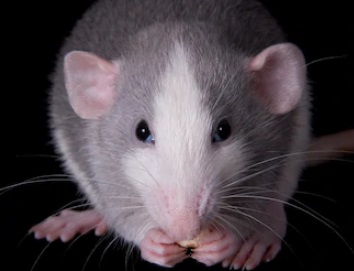
Not only are rats fairly small pets, but they are quiet and relatively simple to care for. If you live in an apartment or share a home, rats make quiet pets. The only noise you may have to worry about is a squeaky exercise wheel, but that can easily be remedied.
In terms of caring for pet rats, there’s nothing terribly complicated about it. Your first priority is to give your pet rat a safe place to live and your second priority is to provide a healthy diet. As long as those two needs are met, all you really have to do is give your rat plenty of attention and make sure he gets the exercise and mental stimulation he needs.
#7. The Cost To Keep A Pet Rat Is Fairly Low
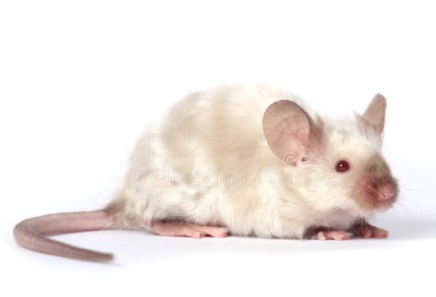
Owning a pet can be expensive, especially a larger pet like a cat or dog. There are certainly some startup costs involved with keeping pet rats, but the cost is much lower than for other pets.
The cost to purchase a pet rat is usually under $15 and the cost to buy a cage with initial supplies, food, and bedding shouldn’t cost more than $100. You can certainly buy a bigger, more expensive cage, but that’s up to you. Other expenses such as veterinary expenses should be limited to an annual checkup – pet rats don’t require vaccinations.
The biggest recurring cost to keep pet rats is the cost of food. Because rats are so small, however, a bag of food could last you several months. You can save money by buying in bulk, just be sure you’ll be able to use all the food while it’s still fresh.
#8. Rats Are Empathic And Can Bond With Their Owners
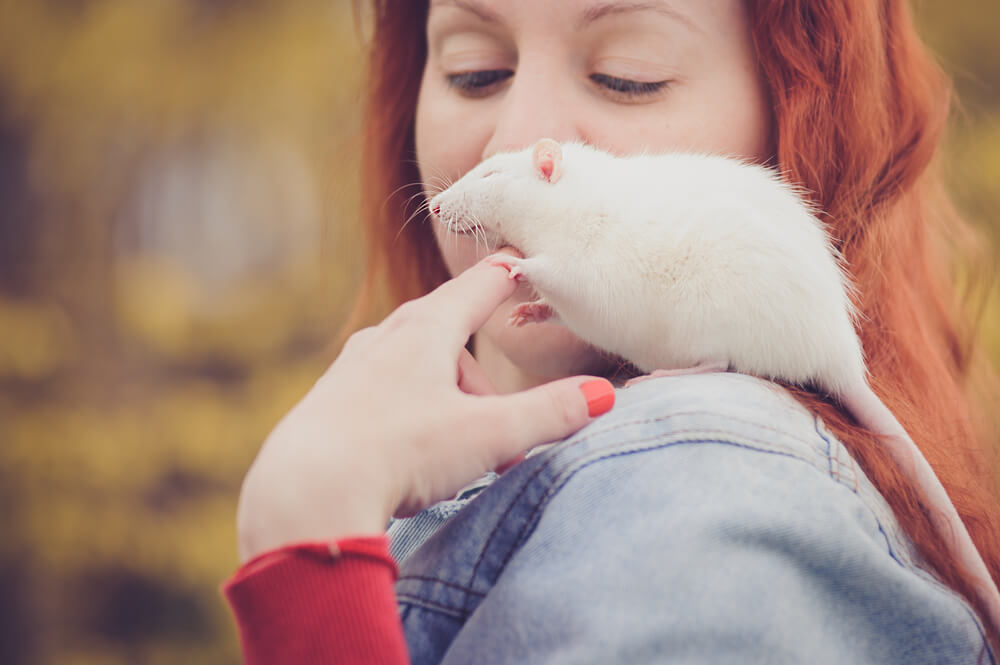
Not only are rats highly intelligent, but they are very empathic and can form strong bonds with their owners. In one study, rats were given a choice of freeing another trapped rat in the same cage or opening a container holding a treat. The results of the study overwhelmingly showed the free rats not only releasing the trapped rat but sharing the treat.
Every pet rat has its own personality, but rats are generally very sociable and like to interact with their owners. Pet rats can be quite affectionate and some like to be petted. Female rats are often more active than males, who will sometimes curl up to nap in their owner’s lap.
#9. Pet Rats Have A Simple Diet
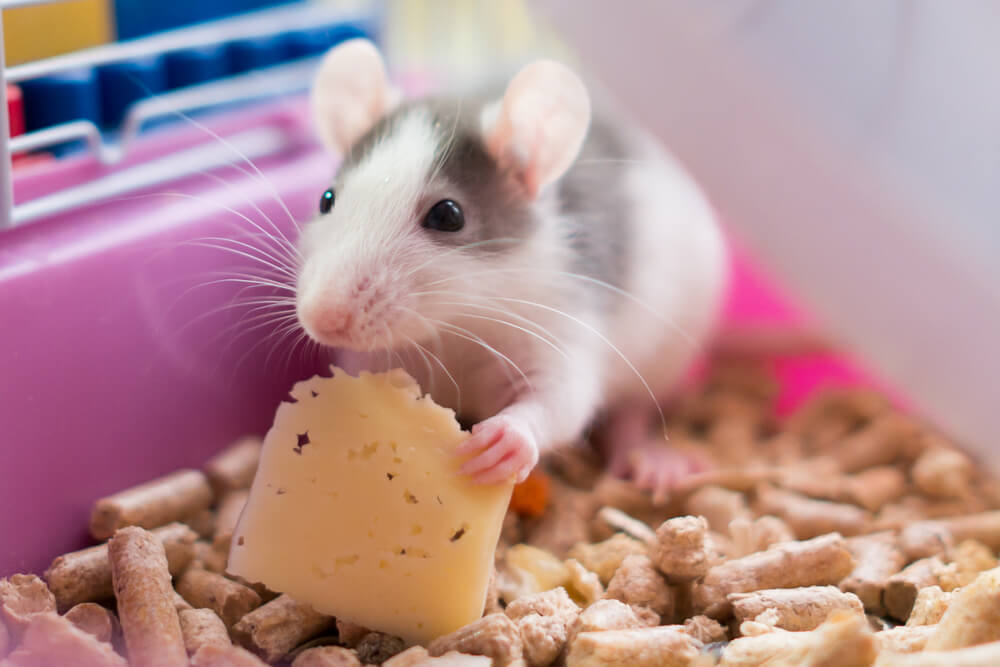
Rats are omnivorous, so basically, they will eat anything. That being said, they do have specific nutritional requirements and need a balance of different nutrients.
The best diet for pet rats is built on a foundation of high-quality pelleted foods. These foods are specifically formulated to meet your rat’s nutritional needs. Supplement your pet rat’s diet with small amounts of fresh foods like fruits, veggies, nuts, and grains. You can even provide occasional treats like cooked chicken, boiled egg, or even dried insects.
In addition to a healthy diet, pet rats require access to fresh water. Like many small animals, pet rats will drink from a water bottle so keep one in your rat’s cage and clean and refill it daily.
#10. They Only Live For A Few Years

Pet rats are fairly short-lived, having an average lifespan of just 3 years. This can be a selling point if you’re looking for a shorter commitment than a dog or cat, but it can also be disappointing once you realize just how wonderful your pet rat is.
The key to maximizing your pet rat’s lifespan is to provide a balanced diet and plenty of exercise and interaction. Annual veterinary checkups are recommended to make sure your rat is in good health and to stay on top of developing health issues.
Is a Pet Rat Right for You?
When you bring a pet rat into your life, you take on responsibility for its wellbeing. You are your pet rat’s primary caregiver which means it’s your job to provide for its basic needs.
Your biggest responsibility as a pet rat owner is to provide a suitable cage and a healthy diet. Fortunately, rats don’t require as much space as larger pets and their dietary needs are pretty easy to meet. Just keep in mind your rat needs a mixture of high-quality pelleted food and other fresh foods to provide the optimal balance of essential nutrients.
Another thing to remember is that rats are incredibly social animals, so it’s generally best to keep a pair or a small group rather than a single rat. You’ll still need to spend time interacting with your pet rat but having another rat in the cage will help meet your pet’s needs for companionship.
Pet rats are a great choice if you’re new to pet ownership or looking for a pet that doesn’t take up a great deal of space. Rats are fairly simple to care for, but that doesn’t mean you should take your responsibilities as a pet owner lightly. These pets still require routine veterinary care, a healthy diet, and plenty of love and attention from you, of course.
Frequently Asked Questions
Can you potty train a rat?
Yes! Rats naturally do their business in a corner, so by placing litter boxes in all four corners of the cage you can train your rat to do his business in a litter box.
Do rats miss their owners?
Rats are naturally very social animals, so they crave companionship and interaction. Pet rats also tend to form close bonds with their owners, so they may very well miss their owner if they are gone.
Do pet rats stink?
Rats are actually very clean animals, and they should not stink as long as you keep up with routine cage cleaning and maintenance. Choosing the right bedding for your rat cage will help minimize odor too.
Do rats like to be petted?
Every rat’s personality is different, but many rats do like to be petted. Rats can form strong bonds with their owners and can become quite affectionate.
Can rats recognize their name?
Yes! Rats are very intelligent animals and can learn their own name and be trained to come when called. They have also been known to beg for interaction with their owners.

